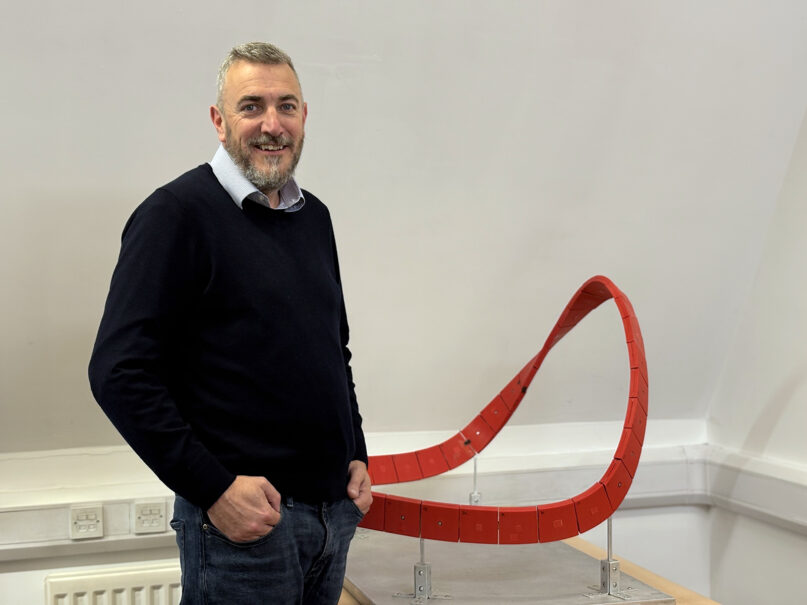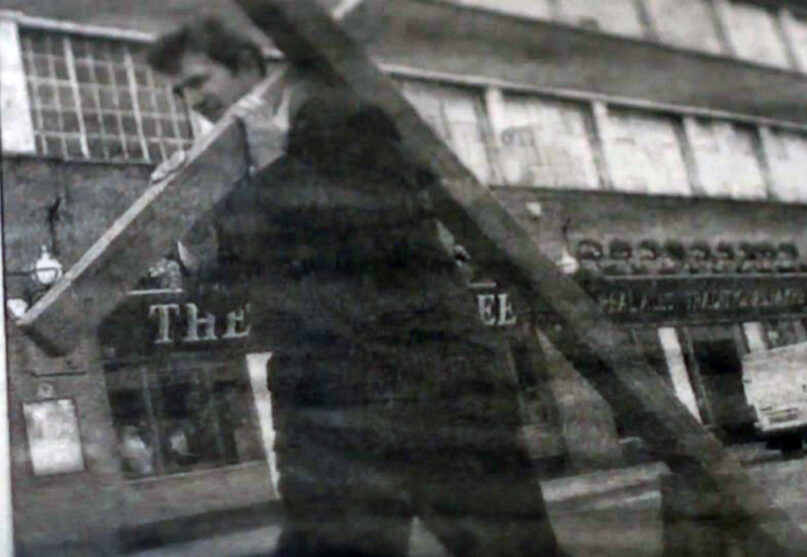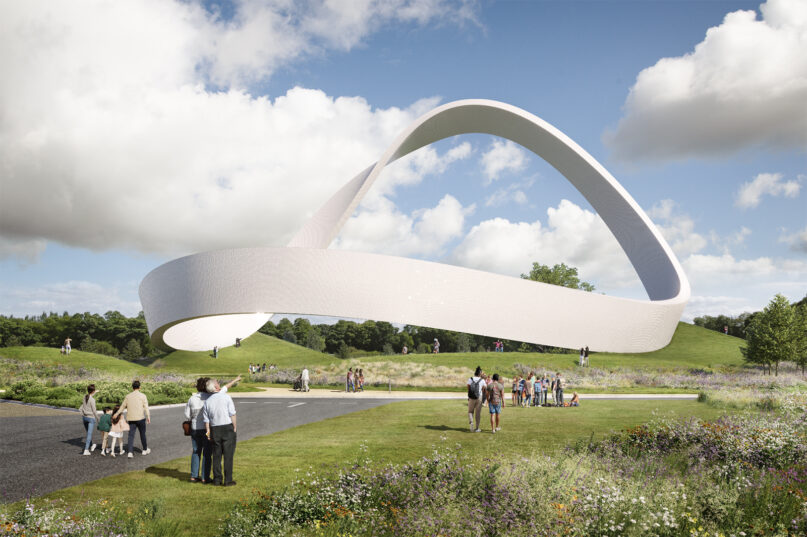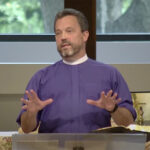COLESHILL, England (RNS) — Richard Gamble’s passion for Jesus has always been outsize. Twenty years ago, he said he had a vision from God to drag a 9-foot wooden cross for 77 miles during Holy Week leading up to Easter.
After that grueling marathon in 2004, God gave him a bigger, bolder vision: Build a wall that tells a million stories of how God has answered prayer.
Last week, Gamble, 56, broke ground on that vision — a 168-foot-tall architectural landmark that is expected to be one of the largest Christian monuments in England, if not the world. (Christ the Redeemer, the iconic statue of Jesus in Rio de Janeiro, is 98 feet.) It is planned to open to the public in 2028.
The Eternal Wall of Answered Prayer, with a price tag of 45 million pounds (or $59 million), will not, however, feature any familiar Christian icons such a cross, a fish, a lamb or a representation of Jesus. Instead it will consist of a giant white Möbius strip stretching nearly the size of a football field, upon which a million small rectangular bricks will be overlaid, each with a digitally linked story of answered prayer accessible on a mobile app.
“We live in a country where Christianity has been pretty much put on mute,” Gamble said in an interview at the Eternal Wall offices near the construction site last week. “To build something that big and unashamedly Christian, I don’t think anybody had the faith that it was going to happen.”

People attend the Eternal Wall of Answered Prayer groundbreaking ceremony, Nov. 5, 2025, near Birmingham, England. (Photo by Jessica van der Weert)
To Gamble, the groundbreaking is itself the result of 21 years of fervent prayer. A one-time software developer, church planter and former chaplain to the Leicester City Football Club, Gamble became a Christian after a visit to a charismatic church at age 20. It immediately changed his life. He quit drinking and gambling and enrolled in a Bible college. After several years in ministry, he decided he wasn’t cut out to be a pastor.
But he never gave up on his deep Christian convictions. In a country where only 21% of people say they pray daily, according to a Pew Research Center study, Gamble wanted to find a way to communicate what he felt to be God’s active role in people’s lives.
The way he tells it, God answered his prayers in stages. Among the first signs was when a woman came up to him after a presentation at a 2015 conference at Redding, California’s Bethel Church, and said, “God wants you to know he’s got some heavenly land for you.”
The exact plot of land, which someone on his prayer team back in England identified — another sign — was given to him by Andrew Edmiston, the son of Lord Robert Edmiston, a British billionaire businessman who established the charity Christian Vision and happened to own the land. Andrew Edmiston also had a vision for a Christian monument in the United Kingdom, Gamble said, and the family’s contribution to the project now totals more than 30 million pounds. About 22,000 individuals have also contributed to the project, Gamble said.
The Eternal Wall of Answered Prayer will sit just off the M6 motorway on the outskirts of Birmingham. The M6 is the longest highway in the U.K., running from the Midlands to the border of Scotland. The location was important to Gamble because the monument will be visible from six miles away and, he hopes, will pique the interest of thousands of drivers and passengers each day.
What they see, however, will be a most unconventional design.

Richard Gamble beside a model of the Eternal Wall of Answered Prayer on Nov. 12, 2025, at his office in Coleshill, England. Gamble said God spoke to him and gave him a vision for the monument in 2004. (RNS photo/Yonat Shimron)
For his vision, Gamble wanted something new and novel, a piece of art. He put his idea before the Royal Institute of British Architects, which held a global competition for the design in 2016. A total of 133 entries from 28 countries were received, and a U.K. firm with a Möbius strip design was selected.
That design was approved by the North Warwickshire Borough Council in 2020, another sign of answered prayer for Gamble. Mathew Guest, a professor of the sociology of religion at Durham University who researches evangelicals in the U.K., said the design’s neutrality probably helped.
“Having religious symbolism in the U.K. beyond the traditional architecture of churches can be very controversial,” Guest said. “In a polarized world where there’s a lot of religious tensions between religious groups, it can be perceived as a potential provocation. And I wonder whether that’s partly the reason for building it in this way.”
Christianity has been declining for years across the U.K. A recent Pew study found that between 2010 and 2020, the Christian share of the U.K.’s population fell to just under half — 49%. During that same time, the share of the religiously unaffiliated increased to 40%. (Muslims make up 6.5% of the U.K. population, approximately 3.9 million people, according to the 2021 census from the Office of National Statistics.)
Independent evangelical churches, including charismatic and Pentecostal groups, may be the one segment of Christianity that is thriving in the U.K., Guest said. Gamble and his family attend Chroma Church, an evangelical congregation in Leicester.

Richard Gamble carries a 9-foot wooden cross during Holy Week in 2004 in England. (Courtesy photo)
For several years now, Gamble and his team of 10 full-time staff have been combing through stories of answered prayers, beginning with the Bible. The idea is to gather a million testimonies of answered prayer, in writing or video. Those testimonies, 500 words each or three minutes of video, describe a time when Jesus answered prayers — for healing, for a job, for recovery from addiction, for reconciliation, for the birth of a child. Only Christian prayers will be included.
Each story will form part of a database digitally loaded on a single brick, the size of a business card on the monument. Visitors to the site will be able to download an app that identifies their location and read, listen to or watch the stories on their phone.
Gamble allows that not all prayers are answered with a yes. Sometimes the answer is “wait,” and sometimes the answer is “no.” The important thing, he believes, is the conversation with Jesus. He knows not everyone visiting the site will be convinced, but he’s hoping to provoke people to have an encounter with Jesus.
“It’s like this secret world in the U.K. that nobody knows that God is alive and answering prayer,” Gamble said. “Nobody talks about it.”

An artistic rendering of the Eternal Wall of Answered Prayer, which will be constructed near Birmingham, England. (Courtesy image)
He’s banking on a monument— far removed from a church, which so few attend nowadays — being the catalyst that motivates people to seek out faith.
“If somebody comes and looks at it and goes, ‘Great piece of architecture, but a load of rubbish,’ that’s a win because they have taken themselves out of a secular environment and considered elements of the Christian message,” he said.



